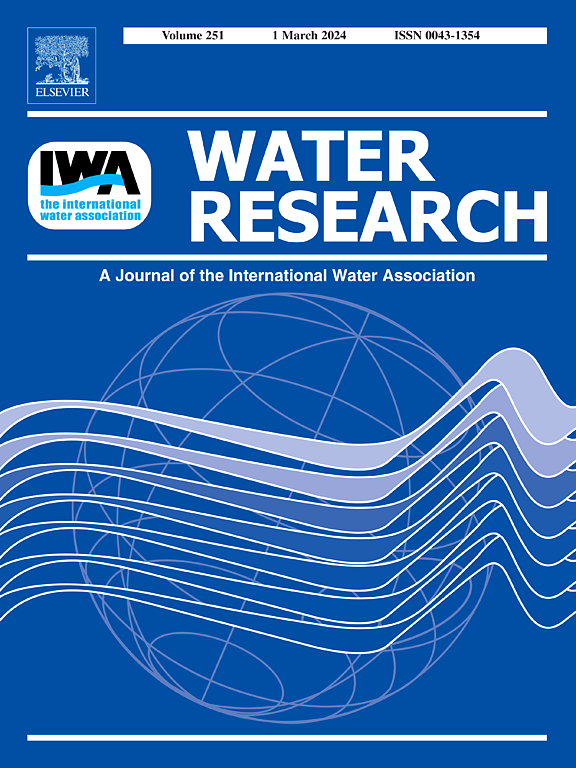舍曲林对厌氧消化的影响:刺激CH4和CO2的产生
IF 12.4
1区 环境科学与生态学
Q1 ENGINEERING, ENVIRONMENTAL
引用次数: 0
摘要
药物,特别是抗抑郁药,是具有潜在深远环境影响的新兴污染物。然而,它们对厌氧消化和随后的CH4和CO2产生的影响在很大程度上仍未被探索。本研究发现,舍曲林在抗抑郁药中名列前茅,在环境水平下意外地刺激了CH4和CO2的产生,分别提高了24.29%和27.13%。在机制上,舍曲林明显破坏COD平衡,导致碳转化途径改变。具体来说,舍曲林增强了中间生态系统的代谢,特别是对CH4的丙酮生成和丙酮分解。这些代谢变化反映在微生物群落的变化上,甲烷菌的相对丰度增加了48.11%。值得注意的是,舍曲林使参与底物代谢(如gapN、prdA)和产甲烷(如mtrA、mcrC)的关键基因的相对丰度增加了12.58 ~ 111.13%。它还直接与参与底物运输、转录和细胞信号传导的关键蛋白(如GLUT、RPB2、ERK)相互作用并改变其表达。这些发现揭示了以前未被认识到的舍曲林对CH4和CO2产生的贡献,强调了重新评估抗生素样物质对厌氧碳转化的影响的迫切需要。本文章由计算机程序翻译,如有差异,请以英文原文为准。

Insights into the effect of sertraline on anaerobic digestion: stimulating CH4 and CO2 production
Pharmaceuticals, particularly antidepressants, are emerging contaminants with potential far-reaching environmental impacts. However, their effect on anaerobic digestion and subsequent CH4 and CO2 production remains largely unexplored. This study revealed that sertraline, ranked among the top antidepressants, unexpectedly stimulated the of CH4 and CO2 production by 24.29% and 27.13% at environmental levels. Mechanistically, sertraline significantly disrupted the COD balance leading to altered carbon transformation pathways. Specifically, sertraline enhanced intermediary ecosystem metabolism, especially acetogenesis and acetoclastic to CH4. These metabolic shifts reflected in microbial community changes, with a 48.11% increase in the relative abundance of Methanothrix. Notably, sertraline enriched the relative abundance key genes involved in substrate metabolism (e.g., gapN, prdA) and methanogenesis (e.g., mtrA, mcrC) by 12.58 to 111.13%. It also directly interacts with and alters the expression of crucial proteins (e.g., GLUT, RPB2, ERK) involved in substrate transport, transcription, and cellular signaling. These findings unveil a previously unrecognized contribution of sertraline to CH4 and CO2 production, underscoring the urgent need to reassess the impact of antibiotic-like substances on anaerobic carbon conversion.
求助全文
通过发布文献求助,成功后即可免费获取论文全文。
去求助
来源期刊

Water Research
环境科学-工程:环境
CiteScore
20.80
自引率
9.40%
发文量
1307
审稿时长
38 days
期刊介绍:
Water Research, along with its open access companion journal Water Research X, serves as a platform for publishing original research papers covering various aspects of the science and technology related to the anthropogenic water cycle, water quality, and its management worldwide. The audience targeted by the journal comprises biologists, chemical engineers, chemists, civil engineers, environmental engineers, limnologists, and microbiologists. The scope of the journal include:
•Treatment processes for water and wastewaters (municipal, agricultural, industrial, and on-site treatment), including resource recovery and residuals management;
•Urban hydrology including sewer systems, stormwater management, and green infrastructure;
•Drinking water treatment and distribution;
•Potable and non-potable water reuse;
•Sanitation, public health, and risk assessment;
•Anaerobic digestion, solid and hazardous waste management, including source characterization and the effects and control of leachates and gaseous emissions;
•Contaminants (chemical, microbial, anthropogenic particles such as nanoparticles or microplastics) and related water quality sensing, monitoring, fate, and assessment;
•Anthropogenic impacts on inland, tidal, coastal and urban waters, focusing on surface and ground waters, and point and non-point sources of pollution;
•Environmental restoration, linked to surface water, groundwater and groundwater remediation;
•Analysis of the interfaces between sediments and water, and between water and atmosphere, focusing specifically on anthropogenic impacts;
•Mathematical modelling, systems analysis, machine learning, and beneficial use of big data related to the anthropogenic water cycle;
•Socio-economic, policy, and regulations studies.
 求助内容:
求助内容: 应助结果提醒方式:
应助结果提醒方式:


